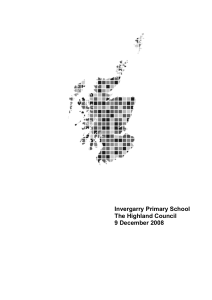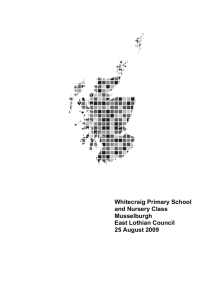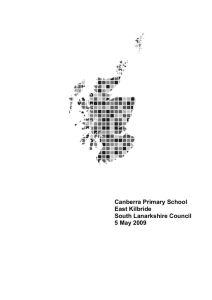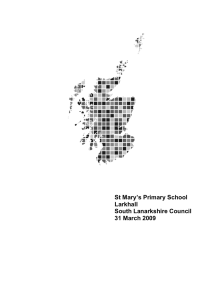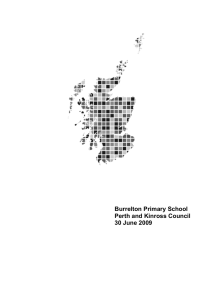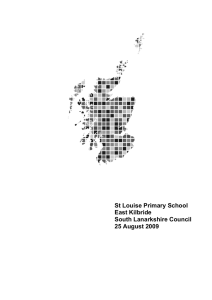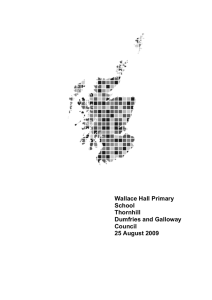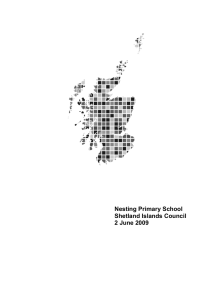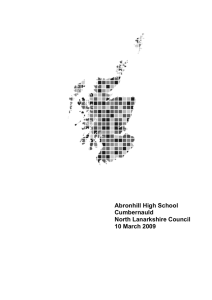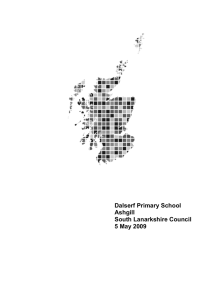Victoria Primary School and Nursery Class Falkirk Council
advertisement
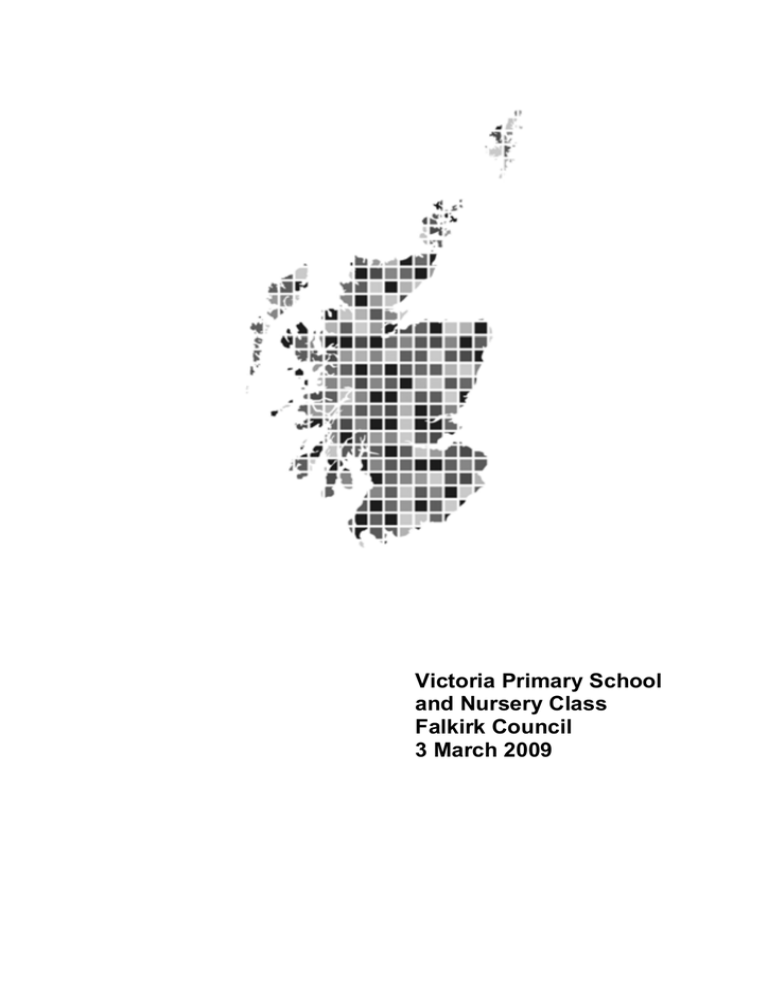
Victoria Primary School and Nursery Class Falkirk Council 3 March 2009 We published a report on Victoria Primary School and Nursery Class in April 2008. That report set out key strengths of the school and main points for action. This follow-through report is based on an inspection visit which was carried out in October 2008. It tells you about improvements since the original inspection in the quality of education which the school1 provides. It also comments on how the school is getting on with the main points for action. First we focus on changes in the core work of the school. We explain how the school has got better at helping children to learn and benefit from being at the school. Next we look at the key processes which enable this to happen, including the involvement of parents2. Our report also describes developments in the ‘ethos’ of the school, by which we mean how well children are cared for and how much is expected of them in all aspects of school life. Finally we comment on improvements in leadership to help the school achieve its aims. A copy of this report has been placed on the HMIE website www.hmie.gov.uk. Where applicable, you will also find descriptions of good practice in the school and analyses of questionnaire returns. 1 2 The term ‘school’ is used to include the work of the nursery class. Throughout this report, the term ‘parents’ should be taken to include foster carers, residential care staff and carers who are relatives or friends. Contents 1. The school 2. Particular strengths of the school 3. How well do children learn and achieve? 4. How well do staff work with others to support children's learning? 5. Are staff and children actively involved in improving their school community? 6. Does the school have high expectations of all children? 7. Does the school have a clear sense of direction? 8. What happens next? 1. The school Victoria Primary School and Nursery Class serves the outskirts of the town of Falkirk. There have been no significant changes to the roll or in the number entitled to free meals since the original inspection. Children’s attendance has improved and is now in line with the national average. 1 2. Particular strengths of the school • The commitment of the headteacher and the education authority to improving the school. • The improvements made to the nursery and the enhanced provision. 3. How well do children learn and achieve? The school has made a positive start to improving children’s experiences. Staff are extending the curriculum to provide children with a broader range of experiences. Nursery staff are interacting well with children to further their learning. Staff are improving planning in key areas such as writing, mental mathematics and computing to further develop children’s skills. In class, children have better access to interactive boards and software to make learning more interesting. There has been an increase in visits outside school to enhance their learning. The headteacher recognises the need to further develop children’s skills in reading and mathematics. The work of children in the enhanced provision is now planned more effectively to ensure they benefit from working alongside children in mainstream classes. The school needs to build on this positive start to ensure all children’s needs are being fully met when they are included in mainstream classes. Children are becoming more actively involved in their learning. They regularly worked in pairs and groups to discuss their learning. Staff should now continue to work on developing activities which encourage children to think and talk about their own learning. A wide range of after school and lunch time activities are on offer to help children develop their confidence and increase their skills in a range of areas. 2 The principal teacher has improved the arrangements to help children who have difficulties in their learning. There is now a clear overview and assessment of children receiving support. Individualised education plans are now in place for children receiving support to help set targets to measure progress in their learning. The school has plans in place to develop this further by including parents and children more actively in setting these targets. 4. How well do staff work with others to support children's learning? Staff are building their relationships with agencies such as educational psychology services and speech and language therapy to support children’s learning. Parents are becoming more involved in their children’s learning and are positive about the recent changes in the school. Parents found the workshops on areas of the curriculum such as reading, promoting positive behaviour and sexual health useful. An open surgery has recently been established with the support of the Parent Council to allow parents opportunities to engage with the school on a range of matters. The Parent Council is very supportive of the school and actively seeks the views of parents on a range of issues. 3 5. Are staff and children actively involved in improving their school community? All staff are now involved in working groups focusing on key areas for improvement across the school. Staff have extended the range of after school clubs to improve children’s wider achievements. Children are involved in improving the school library, the school grounds and in promoting healthy eating and healthy lifestyles across the school. The local charities Shelter, Barnardos and The Salvation Army have benefited from fundraising activities organised by the children. The school is at an early stage in involving children in improvements to their learning. 6. Does the school have high expectations of all children? Staff have taken positive steps to improve pupil’s attendance and promote positive behaviour across the school. They have improved the standard of handwriting and spelling across the school. Staff have made an early start in improving children’s attainment in writing and reading. In mathematics, staff are encouraging children to be more active in their learning but this is an area still requiring further development. Expectations of children’s learning and achievement are still inconsistent across the school. 7. Does the school have a clear sense of direction? The headteacher is providing the school with a clear sense of direction. She has gained the support and trust of staff and parents. The staff have been well supported by the education authority in improving the school over the last year. The management team monitor learning, teaching and children’s attainment in a number of ways. They provide useful feedback to staff to improve teaching and learning. Children’s attainment is now more rigorously monitored and plans are in place to involve teachers more in this process. The depute head teacher now has specific areas for which she is 4 responsible across the school. She should now develop and improve these areas further. The two principal teachers have been effective in securing improvements to the nursery and to pupil support in the school. 8. What happens next? There is clear evidence that the school has made a positive start to addressing many of the points for improvement outlined in the original inspection. With the authority’s support, the headteacher had achieved a sound foundation for the school’s continuing improvement. The school needs now to build on these strengths and continue to introduce improvements which lead to increased attainment and wider achievement. As set out in the original inspection report, we will carry out a further follow-through inspection and will report to parents within two years of publication of the original report. Managing Inspector: Sadie Cushley 3 March 2009 5 To find out more about inspections or get an electronic copy of this report go to www.hmie.gov.uk. Please contact the Business Management and Communications Team (BMCT) if you wish to enquire about our arrangements for translated or other appropriate versions. If you wish to comment about any of our inspections, contact us at HMIEenquiries@hmie.gsi.gov.uk or alternatively you should write in the first instance to BMCT, HM Inspectorate of Education, Denholm House, Almondvale Business Park, Almondvale Way, Livingston EH54 6GA. Our complaints procedure is available from our website www.hmie.gov.uk or alternatively you can write to our Complaints Manager, at the address above or by telephoning 01506 600259. If you are not satisfied with the action we have taken at the end of our complaints procedure, you can raise your complaint with the Scottish Public Services Ombudsman (SPSO). The SPSO is fully independent and has powers to investigate complaints about Government departments and agencies. You should write to the SPSO, Freepost EH641, Edinburgh EH3 0BR. You can also telephone 0800 377 7330, fax 0800 377 7331 or e-mail: ask@spso.org.uk. More information about the Ombudsman’s office can be obtained from the website at www.spso.org.uk. Crown Copyright 2009 HM Inspectorate of Education
